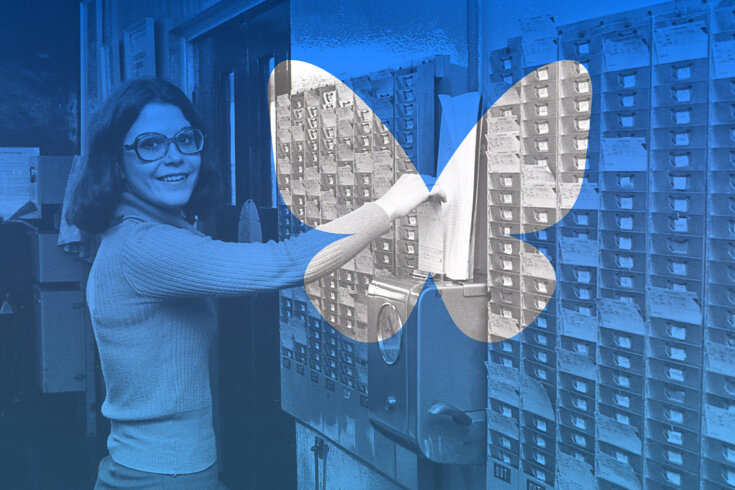About a week after the US presidential election, I signed into my account on Bluesky, the social media platform with the strongest claim to being X’s successor. I hadn’t been especially active in this other place. So I was surprised, that evening, to see a hefty bundle of notifications and more than a hundred new followers—a modest number, to be sure, but significant enough to suggest something had happened. My first feeling was not flattery, but panic. Who were all these people, and why had they all come looking for me at once? What did they want?
Bluesky introduced its “starter packs,” the platform’s term for user-curated lists that identify and recommend accounts, back in June. But in the week following the US election, when the New York Times reported a surge of a million new users, starter-packing took on a new intensity as the influx of people sought to find their chosen communities. Now, scroll through the directory of more than eighteen thousand packs and you can find everything from “Scholars of U.S. Federalism” to “Baking Swifties” to specific outlets, like The Walrus, gathering the accounts of their editors and contributors. The feature offers a handy “follow-all” button, allowing you to beef up your feed immediately and immodestly.
Piecing all this together on the night of my mysterious new-follower surge was not reassuring. My suspicion, later borne out, was that I’d been collected and sorted based on my professional affiliations. If a specific flavour of contemporary online terror might be characterized as “people are talking about me for reasons that are as yet unknown to me,” then a more acute one—at least for me—is “people are talking about me as a purveyor of a particular service or experience as yet unknown to me.” (In the weeks since then, it seems to have become easier to search one’s own name in the starter-pack database and see where you’ve been slotted in and why, a function also offered by the external tool whichpack.com. Perhaps I was not alone in my anxiety.)
The nascency of Bluesky, and the droves of people suddenly arriving, means that the platform’s mores are codifying in real time. It’s like being in high school all over again, blinking at one another from across an empty hallway, trying to decide who we want to be. One question that feels unresolved—and the reason I was so anxious at being starter-packed without my knowledge—is the extent to which we have decided to professionalize ourselves. If the newness of Bluesky felt like high school, rife with abandon and unbridled possibility, then the sudden categorization by starter-pack felt like an adult was striding down the hallway announcing it was suddenly, permanently career day. Of course, for people who work in culture sectors, our online presence has always been conflated with our jobs. Nor are we the only field for which this is the case. But there was a moment—are we still in it? I’m not sure, but I hope so—where it seemed like we might do this one differently.
I see the uncertainty about professionalization on Bluesky with particular acuteness among writers. Pinned posts that offer self-conscious introductions about people’s books and bylines live next to full-throated calls for artists to just bite the bullet and promote themselves like we know they want to. “Do I have to start acting like a serious person over here now that everyone else is here too,” asked Amanda Mull, a Bloomberg Businessweek reporter. A reply from true-crime writer and New York Times columnist Sarah Weinman feels comically symptomatic of the collective uncertainty in response: “Ugh noooooo (except for book articles/promo).” It’s almost a New Yorker cartoon. Writers want to have their cake and eat it, too. It’s only fair when so many avenues for hawking our wares keep getting bought and ruined, leaving us to hoist our blanket and move it over to another patch of sunlight. The desire to be someone entirely different on this platform, creative people in playful community with one another, unbound by the whims of the marketplace or the entities who sign our cheques, coexists uncomfortably with the reality that, probably, at this point, we can’t afford to.
My own profile expresses this same ambivalence. When I opened the account, I gave myself the throwaway bio “Another writer.” I haven’t changed it yet. At first, it was a tongue-in-cheek nod to the community that I had followed over there and was looking for. But it was also a wrench in the longstanding, exhausting expectation that I show up online as part of my job. I joined the platform formerly known as Twitter in December 2009. Just over ten years later, I was working at The Walrus as an editor when employees were given the option to get our social media accounts verified. Post–blue check, my account explicitly became both a trusted news source and a representative of the place where I worked.
When I left for a different job, I kept the blue check and I kept up the habit. My performance targets in both workplaces were tied to digital traffic, so my personal account was effectively a tool for keeping my job. It’s become banal to describe social media as a place we go to perform a particular, curated version of ourselves, but indulge me—the version of myself I was performing, it seems, was of “model employee.” The odious “some personal news” tweet. The dutiful reposting of any piece of content that had to do with my employer. The digital media ritual of performing your layoff with a stiff upper lip.
So: another writer in the bio, instead of a mini resume. I will hold out for as long as possible. I may crack and sneak in a book title or two, especially the next time I have one to promote. My soft refusal to totally professionalize, my insistence that I will show up the way I want, is an attempt to harness one of the few good things about having to rebuild my presence on a different platform. Bluesky does have mores, at least ones that are still crystallizing. Like an informal collective agreement to block harmful content or people immediately and unapologetically. Or—and yes, the bar was on the floor—the very basic ability to engage with the material that we find interesting in real time rather than the content alternately stifled and elevated by an algorithm. We have a crackling opportunity to turn this moment of public discourse into anything we want. Let’s not make it LinkedIn.





